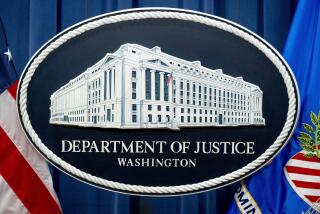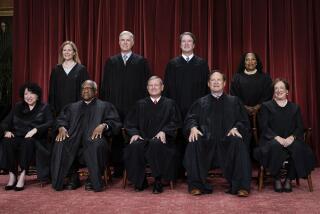Justice Tracking Northrop Payouts; IRS Enters Picture
Justice Department investigators looking into the legality of $7.75 million in foreign payments that Northrop made to South Koreans in 1984 are examining whether some Northrop officials may have eventually received some of the money, according to knowledgeable sources.
In an apparently related development, the Internal Revenue Service has begun its own probe of Northrop’s payments to the Koreans, apparently to determine whether American recipients of the funds properly reported the income.
Northrop is under investigation by a federal grand jury in Los Angeles for violating the U.S. Foreign Corrupt Practices Act in connection with various payments it made to at least three organizations controlled by Korean political operator Park Chong Kyu.
Most of the payments were ostensibly made to build a hotel in Seoul as an indirect means of helping the South Korean government finance the purchase of Northrop F-20 jet fighters.
In addition to its hotel deal, Northrop funded two other South Korean groups controlled by Park, the Dong Yang Express Group and Bankaborrow, whose role ostensibly was to help sell and finance the F-20.
However, the Los Angeles-based aerospace firm never sold any F-20 fighters, the hotel was never built and the money is unaccounted for.
Northrop has claimed in a Korean civil suit that it was defrauded in the deal, but a large number of irregularities in Northrop’s behavior have surfaced.
For example, the firm never registered the deal with South Korean authorities, and a former Northrop consultant has alleged that the payments were part of a lobbying fund.
A parallel investigation of the Korean payments by a panel of the House Energy and Commerce Committee has uncovered evidence indicating that the Northrop consultant, Jimmy Shin, a former night club operator in Honolulu, may have received $1 million of the Northrop payments.
The subcommittee on oversight and investigations has obtained through a subpoena a $1-million bank draft payable to Shin that was drawn on the Korea Exchange Bank’s account with Manufacturers Hanover Trust Co., believed to be part of Northrop’s hotel fund. The Times obtained a copy of the draft.
The existence of the draft suggests that at least Shin may have received some of the hotel funds. Northrop paid Shin $102,000 a year for several years for his consulting work, in which he introduced Northrop officials to Koreans and then helped to entertain them at hostess bars and other places, according to a deposition.
Threatens Contempt Vote
The subcommittee has been attempting to obtain a copy of a report on an internal investigation that the executive committee of Northrop’s board of directors conducted into the Korean deals, but the board has claimed that the report is covered by attorney-client privilege and has refused to release it.
“We are fully prepared to go with a contempt vote,” a subcommittee staff member said late last week. “Jones Day (Northrop’s law firm) was told that we’re prepared to seek a contempt citation in January.”
It is unclear which Northrop executives are under investigation for possibly receiving money.
“Sometimes when you have loose money lying around . . . it has a funny way of sticking to fingers,” one source said. “If you are trying to get money off the books, one of the common lessons is that it becomes progressively easier for people handling it to say, ‘maybe the pile doesn’t need to be this big.’ ”
The grand jury has issued subpoenas to Northrop Chairman Thomas V. Jones, former Executive Vice President Welko Gasich, former Chief Financial Officer William J. McGagh, former Vice President James Dorsey, former Vice President Donald Foulds and Shin.
The four former vice presidents left their jobs at Northrop after the Korean hotel deal surfaced publicly earlier this year. They have declined to be interviewed, as has Jones.
A source outside the government who is knowledgeable about the grand jury investigation said the subpoenas include a demand for personal tax returns of all the individuals. But the more recent involvement by the IRS apparently goes beyond a cursory examination of the tax returns, which the Justice Department could have done on its own.
More to Read
Inside the business of entertainment
The Wide Shot brings you news, analysis and insights on everything from streaming wars to production — and what it all means for the future.
You may occasionally receive promotional content from the Los Angeles Times.











